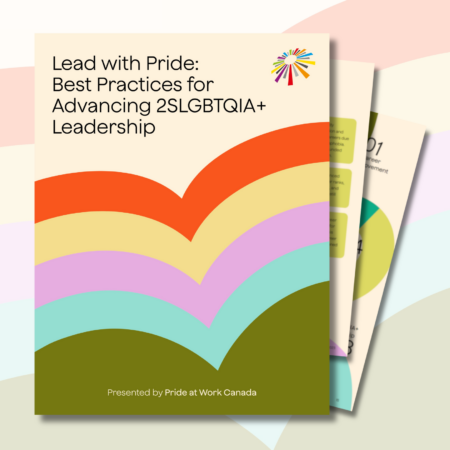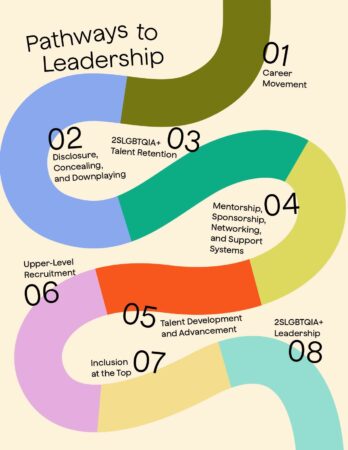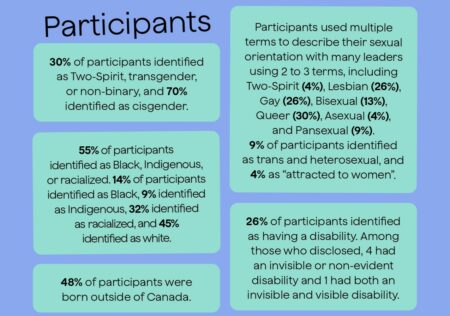Behind the Scenes – Research with Two-Spirit, Queer and Trans professionals leading with pride in their industries
We’re living in a difficult time in which each day we can track both incredible progress for queer and trans representation and rights, alongside tremendous regression and attacks on our communities. Working in the 2SLGBTQIA+ inclusion space often means working in a context of contradictions like this, feeling both pride and hope as well as frustration and fear in our work. This work requires us to recognize and celebrate our progress, and at the same time recognize persisting inequities and continue to fight for ourselves and our communities to prosper and thrive.
With this in mind, we’re proud to celebrate our most recent research project, Lead with Pride: Best Practices for Advancing 2SLGBTQIA+ Leadership, as an empowering and intersectional community effort!

Cover page of the Lead with Pride report.
In this year-long study, we spoke with 23 senior and executive 2SLGBTQIA+ leaders from across multiple industries and regions in Canada to learn about career experiences, aspirations and outcomes. These leaders also represented Persons of Colour, Black, Indigenous, disabled, and migrant communities. The idea for this study came from a lack of documented information about our communities advancing in their careers and reaching leadership positions, and the need for community research to fill this gap – emphasis on “community”! (We also interviewed 13 employers from various sectors and industries, but the focus of this blog will be on our engagement with the 2SLGBTQIA+ leader group.)
Setting up the study
To make this project happen, we formed a team of queer, trans and non-binary researchers who worked in collaboration and consultation with community experts – including from Workforce Warriors, JusticeTrans and the Ontario Digital Literacy and Access Network.
We started with the goal of understanding the pathways that 2SLGBTQIA+ folks take to reach leadership positions, including the challenges and supports that exist on those paths. A big part of this was centering intersectionality in the analysis so we could understand the nuances of this discussion in a way that represents the diversity of our communities.
These research objectives led to the creation of a demographic questionnaire and interview guide for 2LGBTQIA+ leaders which we built in collaboration with our community experts who helped improve the way we approached questions about disability, trans experiences, Indigeneity, career stages and age, mentorship, and identity.
For example, we made sure our questions about identity were purposeful and not there simply to collect more data. We included explanations of why certain data was being collected and how it would be used in the analysis.

Page 15 of the Lead with Pride report.
Quick notes on our interviews
We modeled our interviews with 2SLGBTQIA+ leaders to feel comfortable and casual. While we had an interview guide, we used this as a starting point for the conversations and left space for interviewees to speak about what was important to them in their experiences. While this made it difficult for us to create quantitative statistics (i.e., since not every participant responded to every question), it was more important that the interviewees had agency over how they shared their stories with us.
This is one of the ways we avoided reinforcing typical power dynamics that exist in research – where research can often feel authoritative and can rely on tactics that are invasive and insensitive of those participating in the research. We challenged extractivism in our research by centering the agency and humanity of the people we interviewed.
Quick notes on our analysis and reporting
Intersectionality was centered in our analysis approach, just as it was in our recruitment and interviews. This meant that as we went through our thematic review of interview and demographic data, we synthesized information through a lens of multiple intersecting identities. This approach allowed us to learn from and represent the complexity and diversity of the experiences our communities have as they navigate employment, workplaces and careers. We aimed to avoid separating these experiences into neat categories and instead attempted to represent the compounding nature of homophobia, transphobia, racism, ableism, sexism and xenophobia.

Page 13 of the Lead with Pride report.
Our analysis and reporting were also designed to have a participatory element which allowed research participants to engage with the findings and report before publication. 2SLGBTQIA+ participants attended open workshops during which researchers presented preliminary findings and recommendations, and invited them to provide feedback and ask questions. These resulted in a rich discussion and created an opportunity for the participants to be more engaged with the research – another effort to challenge extractivism in our research, which typically results in participants being disconnected from the outcomes of the projects they give their time to.
Lead with Pride has been an incredibly impactful project to implement, one that brought together community voices and generated challenges for employers in Canada to step up and advance 2SLGBTQIA+ leadership. It’s frustrating to think of how little research like this has been done in Canada, but this is why it’s important that we continue fighting and pushing forward with more community-led research like this! This research allowed us to learn from the diversity of our community’s knowledge and experiences, and we will continue to share more of these learnings and develop tools to support Two-Spirit, queer and trans leaders in our work!
We invite you to discover the full report, comprising the experiences of participants, and recommendations to employers, by clicking here: Lead with Pride: Best Practices for Advancing 2SLGBTQIA+ Leadership.

Misha Goforth (she/her)
Manager of Programs
